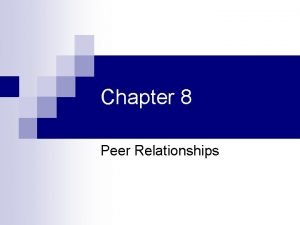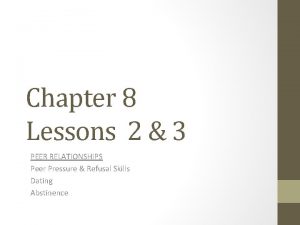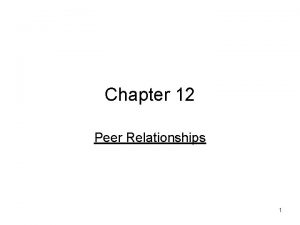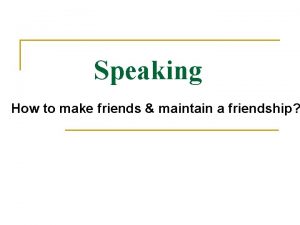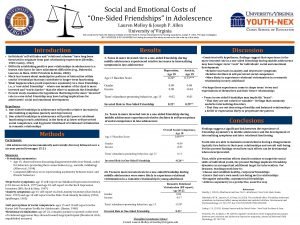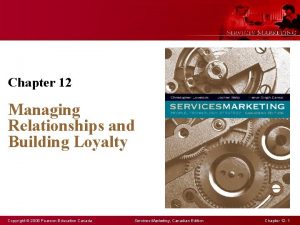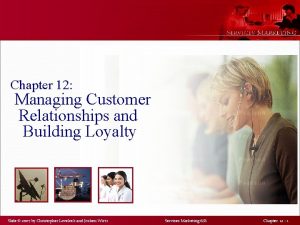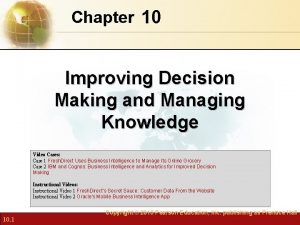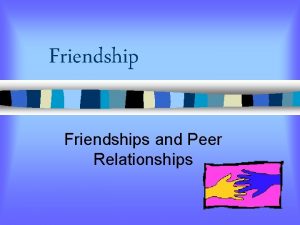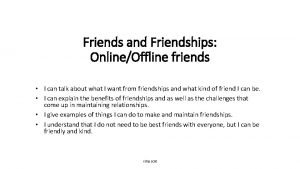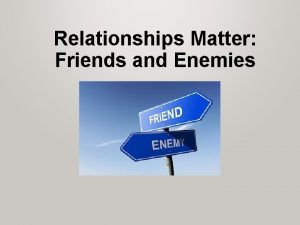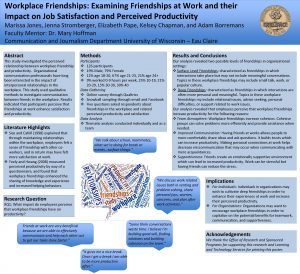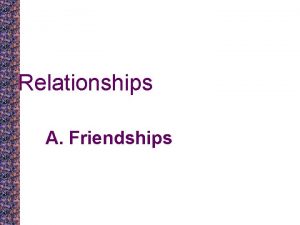FRIENDSHIPS MAKING FRIENDS AND MANAGING TOXIC RELATIONSHIPS Family










- Slides: 10

FRIENDSHIPS MAKING FRIENDS AND MANAGING TOXIC RELATIONSHIPS

Family is the first friend: Where we learn about ups and downs and the changing nature of friendships HAVING FRIENDS Friends offer: Affiliation /common interests, security to learn new things/buffer negativity Cognitive learning: peer tutor, peer collaboration and modelling Benefits: Having friends and keeping friends is aligned to a positive self attitude and functioning future relationships - setup fortnightly meeting with Kris

Listen Make you laugh Comfort you Are trustworthy Are truthful, even if its hard for you Stick around when things are tough Are kind and respectful Don’t put you down Don’t judge you (parents neither) FRIENDS DO

Supporting School Age Friendships - raising children. net. au Playdates/sleepovers: be available and plan some activities Social reminders: introduce self when meeting others (social cues/dynamics) Learn the game rules Buddy system at school: harness school support Special needs: give others ideas on how to include your child TITLE LOREM IPSUM Extracurricular activities to meet children with similar interests: what are they good at and where do they find likeminded friends? Helping Children Make Friends – Parentingscience. com Show your child warmth and respect, not control Be an emotions coach Nurture their ability to read minds Provide a secure social environment Address disruptive behaviour Be understanding and forgiving of other’s mistakes MAKING FRIENDS Ø Challenging at time due to triggers, sense of shame and social, developmental and cognitive delay Teach remorse and making amends Teach conversation skills: pleasant & reciprocal conversations, active listening (eyes, body, quiet, responsive), likes and dislikes exchange

FRIENDS DON’T Put you down Leave you out Make you feel bad about yourself Manipulate you

Signs of Toxic Friendships: TITLE LOREM IPSUM School refusal Withdrawal Excluded Not eating lunch Crying (hysterical) Projection Socially anxious Insecure What Parents Can Do: Read a friendship story: Tell them about your experiences: Ask about their friendships: listen, open questions, build trust, illuminate (would you do that), be patient, get distance (psychologytoday. com) Make a list of potential friends or connect with others outside of school Parenting Helps: FRIENDSHIP TROUBLES Preschoolers rarely have conflict with friends, or if they do, it is solved quickly. Where friendships are disruptive or result in disengagement, as children mature, we can help in how we respond.

What can you do? - Reachout. com How do you feel and what do you want to do? Stop behaviour? Apology too? Is it intentional? Would they stop if you let them know it’s hurting you? Own your behaviour: figure out what you can control and how you can respond Are you being respectful? TITLE LOREM IPSUM The Conversation - Reachout. com Handle things when they happen Have a conversation: I statements, benefit of the doubt, listen, respect, time out Set new boundaries Reduce contact or take a break DO: ignore mean texts DON’T: intentionally leave your friend out of group chats. DO: avoid/reduce contact with DON’T: encourage mutual friends to leave them out DO: talk about friendship issues with other friends DON’T: spread rumours SUPPORTING YOUR CHILDREN DO: stand up to someone who isn’t treating you well DON’T: insult them.

Keeping/Changing Frenemies raisingchildren. net. au What’s causing the problem? Has your child let the other child know? Is the frenemy getting the reaction they want? Options: witty comeback, be assertive or walk away without comment Problem Solving Steps – raisingchildren. net. au Six key problem solving steps TITLE LOREM IPSUM 1. Identify the problem 2. Think about why it’s a problem 3. Brainstorm solutions 4. Evaluate solutions 5. Act on the solution 6. Evaluate the outcome Ending Frenemies – raisingchildren. net. au Decide how to tell the frenemy Watch out for any fallout: contact school and/or link into school counsellors Listen, try and find solutions FRENEMIES Find new friends

Listen and ask questions to understand their point of view. Learn about any of their problems: be interested but don’t advise Ask them what they need and offer genuine support HOW TO BE A FRIEND

RESOURCES RASINGCHILDREN. NET. AU AU. REACHOUT. COM PSYCHOLOGYTODAY. COM PARENTINGSCIENCE. COM QUIZ: FRIENSHIPS QUIZ : HOW HEALTHY IS YOUR GROUP? (REACHOUT)
 Toxic friendships
Toxic friendships Chapter 8 peer relationships
Chapter 8 peer relationships Chapter 8 lesson 1 safe and healthy friendships
Chapter 8 lesson 1 safe and healthy friendships Chapter 8 lesson 1 safe and healthy friendships
Chapter 8 lesson 1 safe and healthy friendships Little friends may prove great friends
Little friends may prove great friends How to maintain friendships
How to maintain friendships One sided friendship definition
One sided friendship definition Empathy friends
Empathy friends Wheel of loyalty
Wheel of loyalty Managing customer relationships and building loyalty
Managing customer relationships and building loyalty Improving decision making and managing knowledge
Improving decision making and managing knowledge

